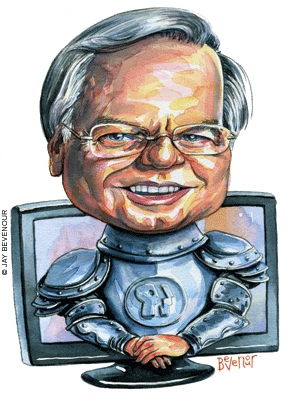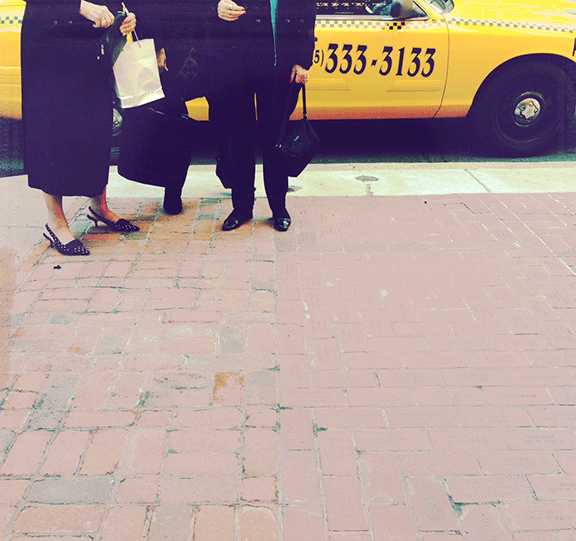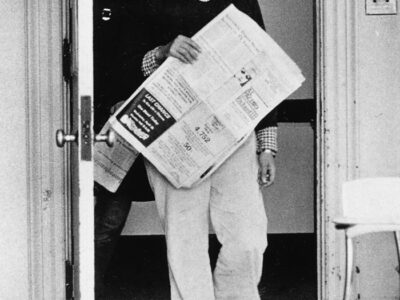
Bill Moyers stood at the podium in the Annenberg Public Policy Center (APPC), listening to a question from Martin Seligman Gr’67, the Zellerbach Family Professor of Psychology.
“We’ve got two sides of human nature,” Seligman was saying. “One is the hidden, the corrupt, what’s really awful. Another part of us is virtuous, noble, less Satan-ly.” Since Moyers had just been saying that the task of journalism is to focus on the former, Seligman (who’s also director of the Positive Psychology Center) wondered: “Why isn’t part of the truth that journalism wants to reveal what’s best inside of us—what’s noble, what’s virtuous?”
For Moyers—who was delivering the APPC’s annual Leonore Annenberg Lecture in Public Service and Global Understanding, titled “Ruminations About the State of Journalism” and prompted by questions and video clips—it’s a question that he and his wife and journalistic partner, Judith, “wrestle with all the time.”
Judith “really does believe, as Thoreau said, that ‘to affirm the quality of the day is the highest of the arts,’” Moyers explained. “On the other hand, when I studied Greek at the University of Texas, I was always impressed with what Socrates is alleged to have said: that to expose the flaws of leaders is to advance the ‘cause of God.’” Moyers also quoted Paul Thompson, one of his mentors at the University of Texas, who told him: “News is what people want to keep hidden. Everything else is publicity.”
“I would not want to live in a world where I didn’t know the evil that men do,” he added. “But I would not want to live in a world where there were no other people trying to correct that evil and to live lives free of that evil.”
The 77-year-old Moyers has been on both sides of the struggle to expose the flaws of leaders, and his abundant experiences buttressed his fluid observations. Since cutting his teeth at 16 as a cub reporter at the Marshall News Messenger in Marshall, Texas, he has spent most of his career in journalism, serving as publisher for Newsday, working as news analyst and commentator for the CBS News with Dan Rather, and hosting the PBS series Bill Moyers Journal, among many other ventures. He and Judith also formed Public Affairs Television, whose productions included the Moyers-hosted documentary series Joseph Campbell and the Power of Myth.
But in his younger days Moyers—who was ordained a Baptist minister in 1954 and earned a master’s of divinity degree at Southwestern Baptist Theological Seminary—oscillated between journalism and politics, serving as an aide to US Senator and then President Lyndon Johnson. All of which helps explain why, when he reluctantly agreed to become LBJ’s press secretary, Moyers told Judith that it was “the beginning of the end,” noting: “Because as the Scripture says, no man can serve two masters.”
In response to a question from an Annenberg School student about whether the relationship between the press and president is “inherently adversarial,” Moyers said: “There’s always tension between people who want to know the truth and people who don’t want to disclose it … except on their own schedule. So yes, there is an adversarial relationship, as in fact, healthily, there should be. If a press gets too close to power, it loses touch with reality. If the press gets too far removed from power, it can’t understand the motives and dynamics of making decisions.”
As for handling that, “I have to say I did not do it very well,” he said, adding dryly that “at one time our credibility was so bad we couldn’t believe our own leaks.”
Though the Vietnam War was not part of his portfolio as an aide, he touched on the difficulties of working as press secretary under Johnson as the war began to escalate.
“We drew our wagons around us and did not want to allow to enter any contrary report or any contrary evidence,” he said, a mind-set that “led to one of the great disasters in American foreign policy.” That experience, and the fact that he had learned nothing about slavery and segregation while growing up in the Jim Crow-era South, convinced him of the “need to scatter whatever darkness I can.” That has sometimes taken the form of documentaries like “Trade Secrets” (about the chemical industry’s efforts to cover up information about toxic materials in their products) and “Washington’s Other Scandal” (about campaign-finance abuses in the Clinton administration).
When Carolyn Marvin, the Frances Yates Professor of Communication, asked whether a “fatally flawed enactment of human relations” in today’s media “works against the healing and communion that must be necessary to a broken world,” Moyers responded: “I don’t think many people in my world would say the mission of journalism is healing. If you can define a mission of journalism, it is to get as close as possible to the verifiable truth. And that truth often hurts.”
In response to another question, Moyers suggested that “the greatest thing Rupert Murdoch could do for journalism would be to uncouple Fox News from the Republican fog machine, because that constant pouring of arsenic in the drinking water of democracy is a very crippling thing to our ability to function.”
Annenberg School Dean Michael Delli Carpini C’75 G’75 asked about the frequent assertion by Jon Stewart, host of The Daily Show, that he is not a journalist but a comedian: “Can he have it both ways? Is there a risk when individuals like Stewart take on some of the functions of professional journalism, but are not bound by the codes of conduct or the norms which journalists operate under?” Citing programs such as CBS’s The Reagans or ABC’s The Path to 9/11, Delli Carpini wondered: “Should there be norms or at least expectations for entertainers or entertainment programs that take on contemporary public issues or contemporary public figures?”
“I certainly think there should be standards for people who do claim to be journalists,” Moyers responded, especially regarding facts. But, he added: “I don’t think Jon Stewart is trying to have it both ways because he eschews being defined as a journalist. What he is, is a great satirist. And that is a marvelous tradition in American life.”
Having told Stewart that if Mark Twain were alive, “he’d probably be doing The Daily Show,” Moyers told his APPC audience that Twain—“whose parodies and satire got him close to verifiable truth”—observed reality “in ways that proved to be more compelling than many of the ordinary journalists of his day.”
Pointing to Stewart’s technique of showing past statements by public figures that completely and often hilariously contradict their current statements, Moyers said that “no one is better at the art of juxtaposition” than Stewart. “The way we get at the truth very often is to be exposed to contrasting opinions and comments by the people who have spoken out of both sides of their mouth,” he said.
As for Moyers himself: “I’m a journalist because I don’t know the answers. Journalism has been for me a continuing course in adult education—my own. And I’ve been fortunate enough over the 40 years to share what I’ve learned with a reasonable audience.”
—S.H.




